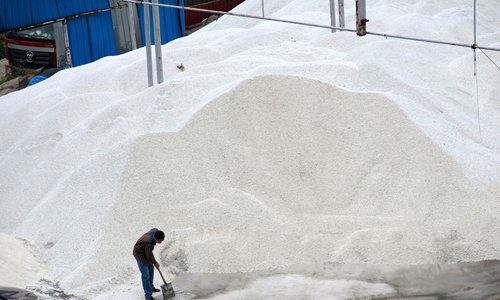
A worker unloads rare earths along the Yangtze River's banks in Southwest China's Chongqing Municipality on May 9, 2019. (Photo: IC)
China will tightly control rare earths as a strategic mineral resource as shown by a recently introduced policy that imposes strict controls over exploration and mining, combined with an export decline, experts noted.
According to figures released by the General Administration of Customs on Tuesday, rare-earth exports in December stood at 3,657.3 tons, down 32.5 percent year-on-year.
According to media reports, it is estimated that total exports of rare earths in 2019 declined to 46,330 tons, the lowest since 2015.
According to Liu Enqiao, a senior energy analyst at Beijing-based Anbound Consulting, it is a trend for China's rare-earth exports to drop as the country is adjusting its rare-earth industry.
Liu noted that instead of buying the products from countries like Japan, which imports China's rare earths and then sells refined products back to China at high prices, China has been making a structural adjustment of the sector. The nation is trying to shift from exporting rare-metal ores for processing to producing value-added products itself, such as permanent magnets and LED illuminants.
On January 9, Ling Yueming, a deputy head of the Ministry of Natural Resources, told a press conference that contract sales of rare earths, as well as radioactive minerals' exploration and mining projects, will be strictly controlled. However, the projects could be transferred to specific bodies, Ling said, citing the ministry's new mineral resource management reform document.
"It is clearer that China will control rare earths as a type of strategic mineral resource tightly…Even though it may not weaponize rare earths as a bargaining chip during the US-initiated trade war with China, it is obvious that China holds a strong price advantage in terms of the costs of mining and refining compared with the US," Liu noted.
The US started to look for new rare-earth sources last year, and it has reached out to countries such as Australia and Canada. However, industry insiders said China's mature rare-earth industry chain and affordable cost meant it would be hard for US companies end their reliance on China.
China controls at least 85 percent of the world's rare-earth processing capacity, according to research firm Adamas Intelligence.


